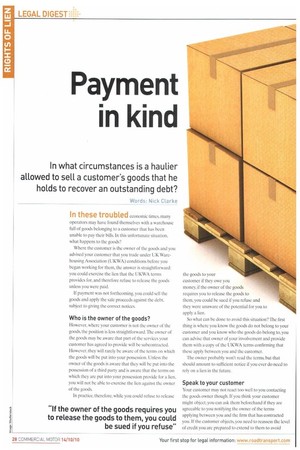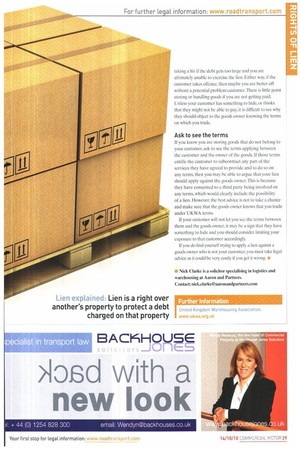Payment in kind
Page 28

Page 29

If you've noticed an error in this article please click here to report it so we can fix it.
In what circumstances is a haulier allowed to sell a customer's goods that he holds to recover an outstanding debt?
Words: Nick Clark In these troubled economic times, many operators may have found themselves with a warehouse full of goods belonging to a customer that has been unable to pay their bills. In this unfortunate situation. what happens to the goods?
Where the customer is the owner of the goods and you advised your customer that you trade under UK Warehousing Association (UKWA) conditions before you began working for them, the answer is straightforward: you could exercise the lien that the UKWA terms provides for, and therefore refuse to release the goods unless you were paid.
If payment was not forthcoming, you could sell the goods and apply the sale proceeds against the debt. subject to giving the correct notices.
Who is the owner of the goods?
However, where your customer is not the owner of the goods, the position is less straightforward.The owner of the goods may be aware that part of the services your customer has agreed to provide will be subcontracted. However, they will rarely be aware of the terms on which the goods will be put into your possession. Unless the owner of the goods is aware that they will be put into the possession of a third party and is aware that the terms on which they are put into your possession provide for a lien, you will not be able to exercise the lien against the owner of the goods.
In practice, therefore, while you could refuse to release the goods to your customer if they owe you money, if the owner of the goods requires you to release the goods to them, you could be sued if you refuse and they were unaware of the potential for you to apply a lien.
So what can be done to avoid this situation? The first thing is where you know the goods do not belong to your customer and you know who the goods do belong to. you can advise that owner of your involvement and provide them with a copy of the UKWA terms confirming that these apply between you and the customer.
The owner probably won't read the terms. but that should amount to sufficient notice if you ever do need to rely on a lien in the future.
Speak to your customer Your customer may riot react too well to you contacting the goods owner though. If you think your customer might object, you can ask them beforehand if they are agreeable to you notifying the owner of the terms applying between you and the firm that has contracted you. If the customer objects, you need to reassess the level of credit you are prepared to extend to them to avoid
taking a hit if the debt gets too large and you are ultimately unable to exercise the lien. Either way, if the customer takes offence, then maybe you are better off without a potential problem customer. There is little point storing or handling goods if you are not getting paid. Unless your customer has something to hide, or thinks that they might not be able to pay, it is difficult to see why they should object to the goods owner knowing the terms on which you trade.
Ask to see the terms
If you know you are storing goods that do not belong to your customer, ask to see the terms applying between the customer and the owner of the goods. If those terms entitle the customer to subcontract any part of the services they have agreed to provide and to do so on any terms, then you may he able to argue that your lien should apply against the goods owner. This is because they have consented to a third party being involved on any terms, which would clearly include the possibility of a lien. However, the best advice is not to take a chance and make sure that the goods owner knows that you trade under UKWA terms.
If your customer will not let you see the terms between them and the goods owner, it may be a sign that they have something to hide and you should consider limiting your exposure to that customer accordingly.
If you do find yourself trying to apply a lien against a goods owner who is not your customer, you must take legal advice as it could he very costly if you get it wrong.
• Nick Clarke is a solicitor specialising in logistics and warehousing at Aaron and Partners. Contact: nick.clarke@aaronandpartners.com




























































































































